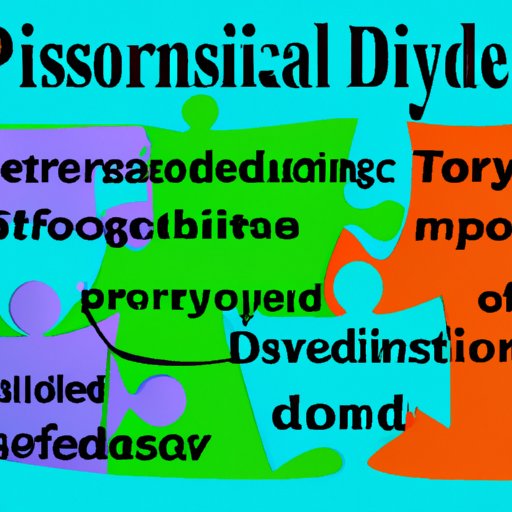Understanding Multiple Personality Disorder
Multiple Personality Disorder (MPD), also known as Dissociative Identity Disorder (DID), is a mental health disorder characterized by the presence of two or more distinct personalities within an individual. It is a complex and controversial disorder that has been debated among professionals for decades, with varying opinions on its causes, symptoms and treatment methodologies.
This article aims to explore the potential causes of Multiple Personality Disorder, from psychological trauma and genetics to different types of abuse and dissociative disorders. We will also discuss available treatment options and the importance of raising awareness about this mental health condition.
Investigating Psychological Trauma
Past psychological trauma may be a significant trigger for the development of Multiple Personality Disorder. Research has shown that individuals who have experienced severe physical, sexual, or emotional abuse are more likely to exhibit dissociative symptoms. When someone experiences trauma, they may employ dissociative techniques to cope with the pain of the event and sever their emotional connection to it. Schizophrenia Research claims that children who have endured abuse are more likely to develop symptoms associated with personality dissociation, including self-depreciation, isolation, and self-injury. Thus, psychological trauma is a predisposition to developing MPD.
Another correlation between psychological trauma and MPD is dissociation. Dissociation refers to the separation of one’s conscious experience from the external world, resulting in increased confusion and disorientation. Symptoms include loss of memory or time, and feeling mentally removed from one’s body. Someone with DID may be seen as “zoning out” or forgetting entire experiences or interactions, troubling their family and close-knit circles.
Exploring the Role of Genetics
MPD affects approximately 1 to 3 percent of the population, but only a small proportion of those clinically diagnosed with MPD have genetic predispositions or family histories. It is unclear how and to what extent genetics plays a role in the development of this disorder. While evidence supports that genetic components may contribute to the disorder, more research is needed to confirm this. Twin and familial studies suggest that genetic factors contribute to the disorder’s development, while others imply that environmental factors play a significant role, leading to differences in adults’ personalities raised in the same household.
The Different Types of Abuse that Lead to MPD
Childhood abuse is a top causative agent of MPD. Sexual abuse, in particular, has been identified as a significant precursor to MPD. This may be due to the individual dissociating from their body during the physical assault, leading to the formulation of an alternative personality that can interact with the external environment. Emotional and psychological neglect can also cause a dissociative effect, where the child develops alternate realities and personalities to cope with the lack of a routine presence in their lives.
In adulthood, abuse and domestic violence can also trigger MPD in individuals. When suffering from domestic abuse, the individual may create an alternative personality to cope with the stressors. It is commonly observed that coercion and emotional manipulation imposed on adults may encourage dissociation to escape from the abusive environment.
Highlighting the Difference between MPD and Other Dissociative Disorders
Dissociative Amnesia is another dissociative disorder that involves memory loss due to a traumatic event. It is different from MPD because MPD involves multiple personalities within an individual. Dissociative Fugue is another dissociative disorder that involves loss of identity and a sudden decision to travel or run away from the current lifestyle and environment. However, a person with MPD can include these symptoms as the entire identity personality.
Available Treatment Options
The most successful treatment for MPD involves the use of psychotherapy, particularly interactive talk therapy to integrate the alternate personalities into one cohesive personality. Treatment can take years, with sessions focused on the recognition of triggers, communication between cognitive personalities, and building trust relationships between the individuals within the personalities.
Medications, particularly antidepressants and anxiety suppressants, can help control the emotional, dissociative symptoms that common mental health disorders accompany. However, individuals with this disorder often experience changes in medication effects, making it difficult for medication to be the most effective treatment methodology.
Hypnosis is another treatment that has shown promise in alleviating dissociative symptoms. It uses suggestive therapy to build trust within all personalities, encouraging communication and recognization of persona differences. Hypnosis, however, is not appropriate for all individuals with the disorder, as it can exacerbate symptoms in some.
Conclusion
Multiple Personality Disorder is a complex yet treatable disorder, typically characterized by the presence of multiple personalities within an individual. While there is quite a bit of debate among medical professionals regarding the underlying causes of MPD, psychological trauma, genetic predispositions, and abuse, particularly sexual violence, are commonly regarded as leading indicators. Therefore, individuals with multiple personality disorder require personalized treatment that focuses on consistent interactions between the different personalities and patient’s therapist.
It is crucial that MPD raises awareness, for it is often misdiagnosed or misunderstood. When correctly diagnosed, the treatment protocols outlined in this article can substantially increase the likelihood of success rate for the path to achieving a better state of mental health. Let us not ignore the condition, and let us reiterate the value of empathetic social support and specialized therapy.
(Note: Is this article not meeting your expectations? Do you have knowledge or insights to share? Unlock new opportunities and expand your reach by joining our authors team. Click Registration to join us and share your expertise with our readers.)
